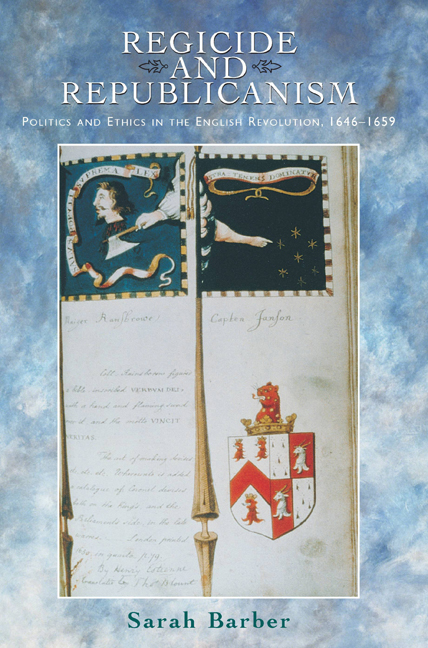Book contents
- Frontmatter
- Contents
- Preface
- List of Abbreviations
- Introduction: Regicide and Republicanism
- 1 Unparliamentary Language and the Dignity of the Crown
- 2 ‘A Mere Man’: Charles Levelled
- 3 The Expense of Blood and Treasure
- 4 King Ahab
- 5 Queen Justice
- 6 Government New Modelled?
- 7 The Engagement of Loyalty
- 8 The Active and the Passive Life
- Epilogue: The Good Old Cause
- Select Bibliography of Printed Sources
- Index
7 - The Engagement of Loyalty
Published online by Cambridge University Press: 03 October 2020
- Frontmatter
- Contents
- Preface
- List of Abbreviations
- Introduction: Regicide and Republicanism
- 1 Unparliamentary Language and the Dignity of the Crown
- 2 ‘A Mere Man’: Charles Levelled
- 3 The Expense of Blood and Treasure
- 4 King Ahab
- 5 Queen Justice
- 6 Government New Modelled?
- 7 The Engagement of Loyalty
- 8 The Active and the Passive Life
- Epilogue: The Good Old Cause
- Select Bibliography of Printed Sources
- Index
Summary
Luke Robinson, recruiter MP for Scarborough and member of the Council of State, was in an optimistic frame of mind in March 1649. Although he was keen to escape the pressures of government in London which were affecting his health and longed to return to Yorkshire to establish himself in his constituency, he confidently informed his provincial supporters that the government was ‘serious’ about settling army arrears and disbanding the forces, and that stability would mean he would soon be in a position to return to Yorkshire. His optimism was premature and the ‘sweet and quiet peace which the Countie with the rest of the nation, hath enjoyed, through the blessing of God upon the Parliaments Councels, and their Armies endeavours’ was rocked by the potential invasion of ‘a Rapatious forreign Scottish Army, joyned with a Fugitive rabble of unnaturall Englishmen, endeavouring the mine of their mother Countrey, for the satisfying of thier own unbounded lusts’.
The sections of the population openly hostile to the Commonwealth regime were growing in number as people became disillusioned at a rate faster than the government could appease them. As such, the question of loyalty became paramount. The degree to which individuals were prepared to owe allegiance to the new government had ramifications throughout all levels of society and affected the ability to function of even the most lowly parish official. John Constable of Bury, Lancashire, caught drinking after hours and asked by the constable what the laws were, replied that he no longer knew, the laws ‘were new modelised [and] Cromwellysed’. The return to fundamental principles did not, in fact, involve reinstituting an ancient, native model of government which people could recognise as theirs, but instituted a form of government which was outside the English experience. The government tried to argue that it was an organically derived, participative state in which each individual made an informed decision to place him or herself under its protection and guidance, but that necessitated the people's recognition that they would participate and be protected. In order to build loyalty, the government had to repeat the traditional structures of allegiance, but to a revolutionary system which had arisen through political expediences which were difficult to justify.
- Type
- Chapter
- Information
- Regicide and RepublicanismPolitics and Ethics in the English Revolution, 1646–1659, pp. 174 - 201Publisher: Edinburgh University PressPrint publication year: 2020



